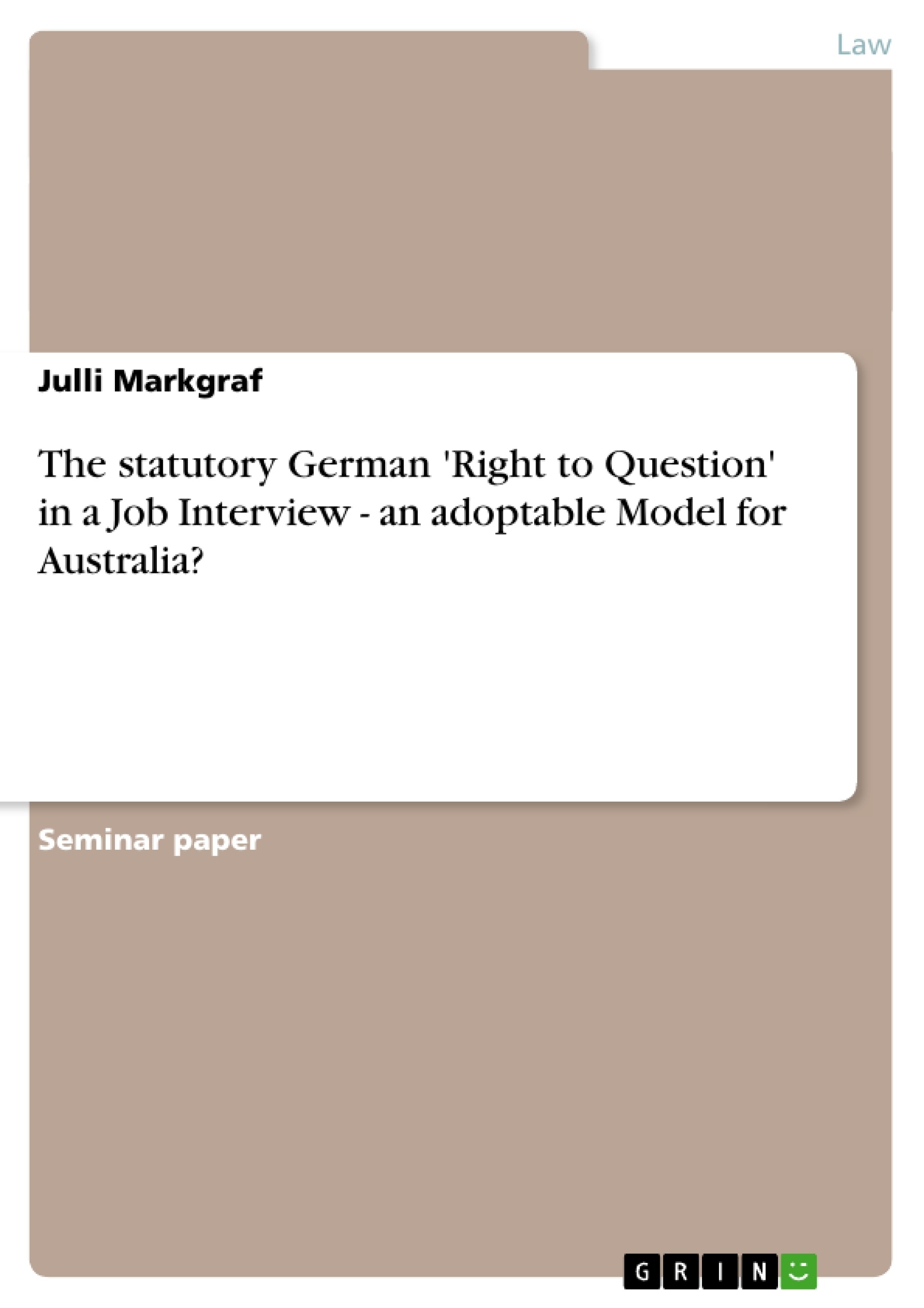In the past three decades a rapid growth of internationalisation and
globalisation has taken place in the business world. This development
has had a significant effect on the labour market. Nowadays,
recruitment, application and selection of personnel takes place in a
global market. Consequently, Human Resources Management requires
a cross-cultural assessment for hiring international employees. This
also includes the different legal systems, which provide diverse rights
and duties. Furthermore, human capital is regarded as a sensitive
topic. Here, the gap between cost-consciousness and efficiency of
conducting business might stand against the protective and supportive
rights of the employee. Therefore, the selection of personnel plays a
crucial role because employees can not be easily dismissed.
One of the elementary steps within the application process is the job
interview. At this stage, the employer aims to get a holistic image of
his future employee by asking questions. However, not all questions
have to be answered by the applicant truthfully. Thus, the future
employer might be not able to gain a realistic picture of the candidate.
Some legal systems, such as under the German law, provide the
candidate with an implied “right to lie” which has no effect on the legal
validity of a contract. Basically, three different question types exist: 1.
questions with a duty of disclosure, 2. lawful questions and 3. unlawful
questions.
This paper is primarily designed as a tool for applicants and Human
Resources Managers from Germany and Australia, to familiarise them
with the particular rights, duties and consequences of the “right to
question” in a job interview, with a focus on the German legal system.
In the first section , the paper focuses on the general topic of personnel
selection with a particular focus on the recruitment process and the role of the job interview as a part of this procedure. The statutory
German “right to question”1 in a job interview will also be illustrated in
the first section. The adaptability of the German model to the
Australian legal system will then be examined; the outcome of which
form the substantive conclusions provided in the final section.
Inhaltsverzeichnis (Table of Contents)
- Introduction
- Selection of Personnel
- The Recruitment Process
- Job Interview
- Legal Basis of Selection of Personnel in Germany
- German Constitution
- Entitlements and Duties
- Legal Relationship between the Parties
- Employers Perspective
- Employees Perspective
- Legal Consequences of Default
- General Effects
- Specific Effects
- Works Council Constitution Act
- Adaptation to Australia
- Overview of Australian Legal Environment
- Examination
- Conclusion
Zielsetzung und Themenschwerpunkte (Objectives and Key Themes)
This paper provides a comprehensive analysis of the "right to question" in a job interview, focusing on the German legal system and exploring its potential applicability to Australia. The paper aims to equip applicants and Human Resources Managers with valuable insights into the rights, duties, and legal consequences associated with this right.
- The role of the job interview in the recruitment process
- The statutory German "right to question" and its legal basis
- The potential for adapting the German model to the Australian legal system
- The legal consequences of breaching the "right to question"
- The impact of internationalization and globalization on human resources management
Zusammenfassung der Kapitel (Chapter Summaries)
- The introduction explores the changing landscape of the labor market due to globalization and internationalization, highlighting the significance of human capital and the selection of personnel. It introduces the "right to question" in job interviews and its legal implications, particularly in the German legal system.
- The second chapter focuses on the selection of personnel, emphasizing its importance in human resources management. It outlines the recruitment process, including the need assessment, the appointment of a selection panel, the development of a recruitment strategy, and the drafting of the job description. This chapter also addresses the role of the job interview within the overall recruitment process.
- The third chapter delves into the legal basis of personnel selection in Germany. It examines the German Constitution, exploring the rights and duties of employers and employees in relation to the "right to question." It also discusses the legal consequences of defaulting on these rights and duties, covering both general and specific effects.
- The fourth chapter examines the adaptation of the German "right to question" to the Australian legal environment. It provides an overview of the Australian legal landscape and explores the potential challenges and opportunities for adopting this legal model.
Schlüsselwörter (Keywords)
Key terms and concepts explored in this paper include: human resources management, recruitment process, job interview, right to question, German law, Australian law, employment contract, legal rights and duties, globalization, internationalization, human capital.
Frequently Asked Questions
What is the "Right to Lie" in a German job interview?
Under German law, an applicant has an implied right to answer truthfully or even lie if the employer asks unlawful questions (e.g., about pregnancy or religion).
What are the three types of questions in a job interview?
They are classified as: 1. Questions with a duty of disclosure, 2. Lawful questions, and 3. Unlawful questions.
Could the German model be adopted in Australia?
The paper examines this possibility, noting that Australia's legal environment differs significantly, especially regarding protective employee rights and constitutional basis.
What happens if an applicant lies about a lawful question?
If the question was lawful and relevant to the job, a lie can lead to the termination of the employment contract due to fraudulent misrepresentation.
What role does the Works Council play in Germany?
The Works Council Constitution Act provides specific regulations on how personnel selection and interviews must be conducted to protect workers' rights.
- Citation du texte
- Julli Markgraf (Auteur), 2003, The statutory German 'Right to Question' in a Job Interview - an adoptable Model for Australia?, Munich, GRIN Verlag, https://www.grin.com/document/22519



